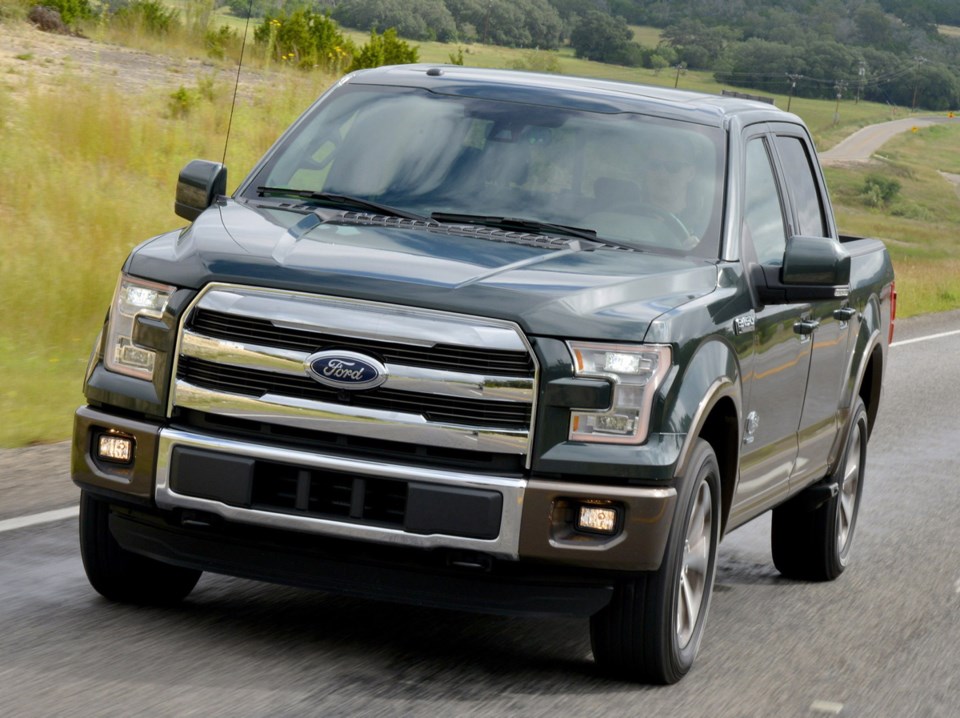Are you overweight or obese? Sixty-nine per cent of North Americans are, according to the U.S. Centers for Disease Control and Prevention. In fact, the average North American is 23 pounds heavier than his or her ideal body weight, according to the CDC.
Having just sampled the newest Ford F-150, I think I have a solution: Call Ford’s engineers. After all, they put North America’s favourite vehicle on a diet, thoroughly redesigning the F-150 for its 2015 model year edition.
By increasing the use of high-strength steel in the F-150’s frame to 77 per cent from 23 per cent, and employing military-grade aluminum-alloy for the F-150’s body, the engineers managed to get this heavy hauler to accomplish what most of America cannot: lose weight. After shedding 320 kilograms, the truck is able to utilize a smaller-than-previous-generations engine and still deliver impressive towing and hauling capacity.
The base powerplant is a 3.5-litre V-6 rated at 282 horsepower and 253 pound-feet of torque that can tow up to 3,450 kg of your favourite plaything. Yet it can also haul 870 kg of accompanying lifestyle debris.
There’s also a 2.7-litre EcoBoost engine with 325 horsepower and 375 pound-feet of torque that’s capable of yanking 3,850 kg and schlepping 1,000 kg.
If you’re more of an old-school type, then opt for the tried and true 5.0-litre V-8 rated at 385 horsepower and 387 pound-feet of torque. This muscular chunk of Detroit know-how has 5,000 kg of towing capacity and a 1,500-kg payload.
Finally, there’s the star athlete of the bunch: a 3.5-litre EcoBoost V-6 rated at 365 horsepower and 420 pound-feet of torque that dishes out 5,500 kg of towing capacity and a has payload rating of 1,480 kg.
All engines are mated to a six-speed automatic transmission. Both rear-wheel-drive and all-wheel-drive variants are offered. Depending on the model, the truck’s U.S. Environmental Protection Agency-rated combined fuel economy estimates range from 18-20 mpg.
If choosing one of those engines is too tough, my suggestion is to start by deciding which trim level you want: XL, XLT, Lariat, King Ranch or Platinum. Also, be sure to pick one of the three cab styles: Regular Cab, SuperCab or SuperCrew. Then, there are three bed lengths: 5.5-foot, six-foot and eight-foot.
If the engines seem small for a pickup, my advice is to try one before you criticize. The test vehicle Ford supplied was plenty powerful, despite being a four-door SuperCrew with a 145-inch wheelbase. Of course, it was powered by the top-of-the-line EcoBoost V-6, with an EPA rating of 17 mpg city, 23 mpg highway.
Despite having lost weight, the F-150 will feel familiar to the faithful. Like previous versions of this workhorse, it seems more agile than its size suggests. It’s very easy to manoeuvre on a job site, in the brush or in a big-box store parking lot. And when a road trip is called for, you might be surprised to find that it comfortably and confidently dispatches its duties.
Some of that is due to the boatload of driver assistance features added for the 2015 redesign, including park assist and a 360-degree view camera, not to mention adaptive cruise control, collision warning, blind-spot monitoring with rear cross-traffic alert, lane keeping assist, and hill descent control. You can also opt for Curve Control, which helps maintain control of the vehicle in corners.
Controlling this rig is easy, however, thanks to the thoughtfully designed interior, which has big beefy knobs and buttons that are effortless to hit, even while wearing work gloves. The seats were all-day comfortable, while the rear folded for carrying cargo rather than people. If there’s any knock against the F-150, it’s that while the interior has a number of soft-touch surfaces, its ambience is merely OK for the price. Plastic and switchgear quality is best described as durable.
Nit-picking? Perhaps. But other items make up for it.
Say you’re towing a trailer. The F-150’s new smart trailer tow module will alert you to a light on your trailer that has burned out.
And then there are the seats, which are nestled in a quiet cabin that’s roomy enough for all of us overfed North Americans. There’s also a locking tailgate that includes an integrated tailgate ladder that pulls, and a new BoxLink system is also offered, with storable cargo ramps and lockable aluminum tie-down cleats.
Given the versatility that this pickup truck offers, its price tag is well within reason. And considering the F-150’s breakthrough use of aluminum, it’s easy to see that this new Ford will continue the tradition of its forbearers. After 38 years as North America’s best-selling truck and 33 years as its best-selling vehicle, it’s little wonder that one rolls off the production line every 35 seconds.
After driving one, you’ll know why.



